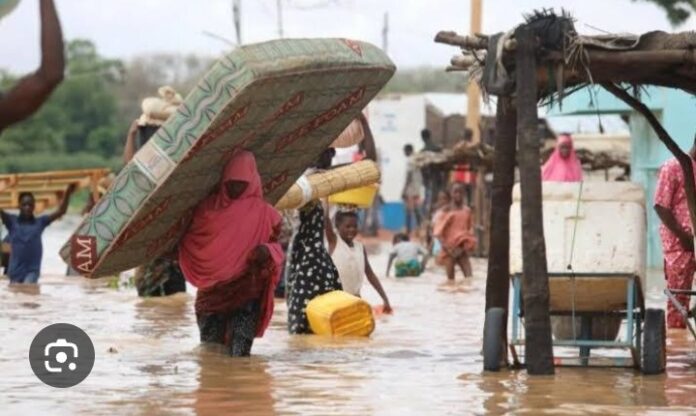By Abdullahi Inuwa
Maiduguri, Borno State – When the skies opened over Maiduguri last week, few could have imagined the destruction that would follow. Within hours, key communities including Gomari, Bulumkutu, Jidari, and ITE were submerged, transforming roads into rivers, homes into islands, and dreams into debris. For the capital of Borno State—already bearing the scars of over a decade of insurgency—this latest calamity is both a humanitarian and infrastructural emergency demanding urgent, coordinated action.
The deluge has left in its wake collapsed buildings, eroded roads, flooded farmlands, and displaced families. Mothers carry babies on their backs while wading through waist-deep waters. Children, barefoot and bewildered, sit atop broken furniture. Cars have become boats, and hope is thinning—one drop at a time.
Flooding in Maiduguri is not a new phenomenon. Each rainy season, residents brace themselves for the worst. But this year, the impact has been particularly devastating. Environmentalists blame a mix of poor drainage systems, unregulated urban expansion, and climate change.
According to Dr. Ali Bukar, a climate resilience expert at the University of Maiduguri, “The city has outgrown its infrastructure. What used to be rural floodplains are now densely populated urban areas with no proper drainage planning. We’re building on natural waterways without giving nature an alternative route.”
The Borno State Emergency Management Agency (BOSEMA) estimates that over 15,000 residents have been affected, with more than 3,000 households either partially or completely displaced. Schools and mosques have become makeshift camps. Livelihoods are washed away—literally—with small businesses and roadside traders counting losses in millions.
In Bulumkutu, a heavily impacted community, 37-year-old Aisha Garba narrates her ordeal: “The water started rising at midnight. Before we knew it, our mattresses were floating. My husband and I carried our children out through the window. Everything we owned is gone.”
Like Aisha, many residents are now relying on food handouts from NGOs and local philanthropists. There is fear of disease outbreaks—cholera, typhoid, and malaria loom large.
Meanwhile, 68-year-old Baba Mustapha, a retired civil servant in Jidari Polo, asked a pointed question: “How can we suffer flooding in 2025 when billions are budgeted yearly for environmental protection?”
Experts have identified five major causes of Maiduguri’s persistent flooding: Blocked Drainage Systems: Gutters and canals are either nonexistent, shallow, or filled with refuse.
Unregulated Housing: Structures have been built on wetlands and riverbanks without environmental assessment.
Climate Change: Erratic weather patterns have led to heavier and more unpredictable rainfall.
Lack of Political Will: Previous promises to dredge rivers and create buffer zones remain unfulfilled.
Inadequate Public Awareness: Many residents dump refuse into water channels, worsening the problem.
“Without a multi-sectoral approach, we will keep witnessing this cycle of flooding, suffering, and abandonment,” said Engr. Musa Zannah, a consultant in urban infrastructure.
There is hope—but only if proactive steps are taken. Stakeholders across all levels must act, and quickly.
The Borno State Government, in partnership with the World Bank and the Federal Ministry of Environment, must urgently develop and implement a modern drainage master plan tailored to Maiduguri’s topography. This includes dredging rivers, expanding canals, and constructing retention basins to hold excess water during peak rains.
Illegal structures built on waterways must be removed, and future constructions strictly regulated. The Ministry of Lands and Survey must work with the Borno Urban Planning and Development Board (BUPDB) to enforce zoning laws.
Residents must be educated on the dangers of dumping refuse into drainages. Monthly environmental sanitation exercises—once a staple in northern cities—should be revived and enforced. Community development associations (CDAs) can play a leading role here.
With modern meteorological tools, the government can establish an early warning system. This would help communities prepare in advance for severe weather events, reducing casualties and damage.
In the short term, victims need shelter, food, water, and medical aid. The National Emergency Management Agency (NEMA) must coordinate with BOSEMA and international relief agencies to deliver immediate assistance. Additionally, compensation should be given to those who lost property due to government negligence or failed drainage systems.
The planting of trees along riverbanks and flood-prone areas can serve as natural buffers. NGOs and youth groups can be mobilized for tree-planting campaigns, turning Maiduguri green again.
For communities in highly vulnerable zones, the state government must begin phased relocation to higher grounds. New resettlement areas must be provided with basic infrastructure—roads, schools, water, and electricity.
Governor Babagana Umara Zulum, known for his proactive governance, has visited affected areas and directed the immediate provision of relief materials. Speaking during a tour of flood-hit communities, he pledged to “fast-track interventions and ensure a lasting solution.”
The Borno State Commissioner for Environment, Alhaji Kabir Wanori, also announced plans for the desilting of major drainages before the next heavy rainfall.
But for many residents, promises must translate to tangible action. “We are tired of visits and speeches,” said 29-year-old Musa Goni of Gomari. “We need machines on the ground, not microphones in the air.”
Maiduguri is at a crossroads. A city rising from the ashes of insurgency cannot afford to be crippled by rain. Its resilience must extend beyond security to environmental sustainability.
This flooding should serve as a wake-up call. A city of over a million people cannot rely on outdated infrastructure, overwhelmed emergency response systems, and neglected urban planning. The cost of inaction is too great.
The people of Maiduguri are not asking for miracles—they are asking for gutters that work, houses that don’t float, and leaders who prioritize the welfare of their citizens over political pageantry.
As the rainy season progresses, the clock is ticking. Will Maiduguri rise above the waters or be swept away in yet another flood of broken promises?
Abdullahi Inuwa Social Commentator ainuwa303@gmail.com




